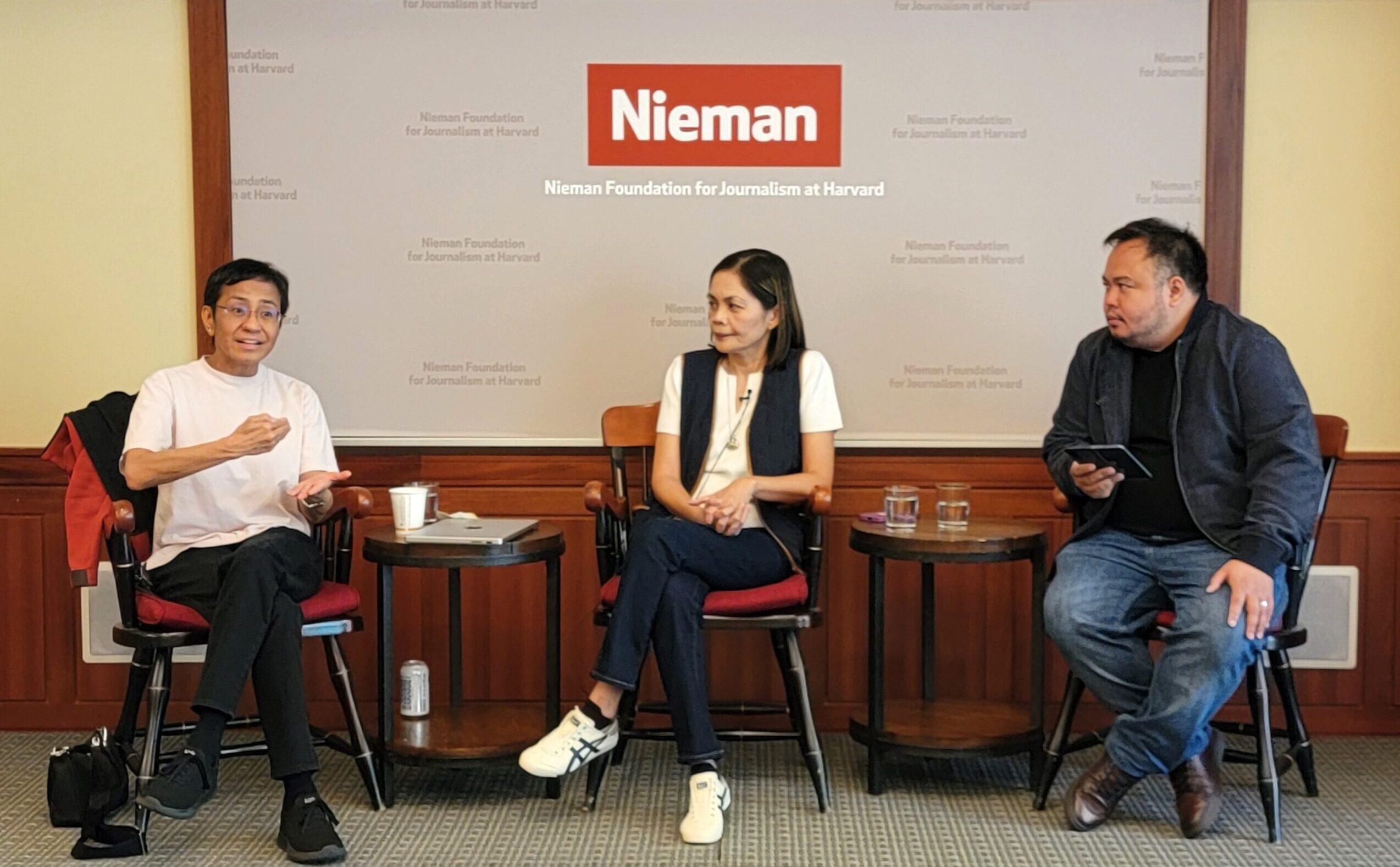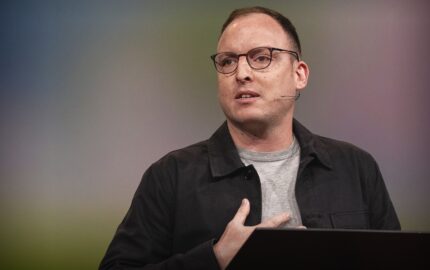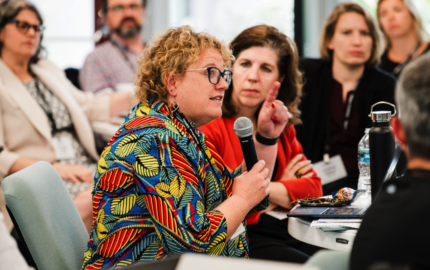As a Nobel laureate and 2018 Time Magazine Person of the Year, Maria Ressa is one of the most formidable journalists of our time. In recent years, she has received 10 arrest warrants for her work exposing the corruption of former Philippine President Rodrigo Duterte and was convicted of cyber libel. The news site she co-founded, Rappler, with Glenda M. Gloria, NF ’18, has faced repeated legal threats and been ordered to shut down, though both Ressa and Rappler were acquitted of five tax fraud charges last year.
Ressa and Gloria, executive editor of Rappler and recipient of the 2023 Laureate for Southeast Asia for Women in News Editorial Leadership by the World Association of News Publishers, spoke at the Nieman Foundation in May about the tension when working with tech companies, fighting disinformation online, avoiding both sides-ism in news stories, and their reactions to American press coverage of the Israel-Hamas war in Gaza. Edited excerpts:
As a Nobel laureate and 2018 Time Magazine Person of the Year, Maria Ressa is one of the most formidable journalists of our time. In recent years, she has received 10 arrest warrants for her work exposing the corruption of former Philippine President Rodrigo Duterte and was convicted of cyber libel. The news site she co-founded, Rappler, with Glenda M. Gloria, NF ’18, has faced repeated legal threats and been ordered to shut down, though both Ressa and Rappler were acquitted of five tax fraud charges last year.
Ressa and Gloria, executive editor of Rappler and awardee of the 2023 Laureate for Southeast Asia for Women in News Editorial Leadership by the World Association of News Publishers, spoke at the Nieman Foundation in May about the tension when working with tech companies, fighting disinformation online, avoiding both sides-ism in news stories, and their reactions to American press coverage of the
Israel-Hamas war in Gaza. Edited excerpts:
On current coverage of the war in Gaza and student protests
Glenda M. Gloria: The impact of the Gaza war has not been completely told through the lens of various sectors from afar and from the region itself. It's all a lot of noise, right? A lot of surface, a lot of academic tinkering. But I think there's a deeper dive that is being required of us. The impact of highly visualized weapons, modern warfare, and on homes and families, on the students.
I would love to read more and watch more about how this is impacting the student movement all over America because it's very diverse. The experience in Columbia would be different from Harvard — but not just the Ivy League schools, right? How is this impacting families, people, students graduating, who have not graduated, etc.? These are stories that need to be told because this is a historic moment vis-à-vis war. The Vietnam War — it was different. The wars before Gaza, those were different wars. This is your most modern, most up-close war from very afar, but also has the most impact on America, and further polarizes it to a degree. And there's not enough stories that I'm reading or watching that would reflect the kind of feelings and impact and consequences on lives and your plans and your future and how you look at the world. I need to read stories like that.
Maria Ressa: It almost feels like American journalists are walking on eggshells. You feel what we've gone through in the Philippines. It's a chilling effect, and actually it is power and money that is chilling. Somehow the two worlds of the Jewish [community] and the very real fear they have, but at the same time the violence that has gone [on] and then the [struggle of] Palestinian journalists, what is happening in Gaza — somehow they need to combine. So for me, where do you go with this? We go back to our worlds. We go back to the meaning. We have to tell the stories that [Gloria] just talked about, in ways that redefine what's being put on top of us.
On the tension between working with tech companies and reporting on them
Gloria: As far as the newsroom is concerned, we have an AI cluster [a working group]. We formed it really focused on how AI is governed, how tech is governed, and that's the kind of expertise or the main authority that we want Rappler to be known for.
On the other hand, it's a frenemy situation, because while we expose Facebook, we are partners of Facebook in terms of fact-checking. Do we romanticize the relationship? No. I mean, people are saying, “Why do you get grants from Facebook as fact-checkers?” Why not?
So, on the newsroom level, we're doing governance, we're scrutinizing tech. But on the other hand, [we’re] also enabling our reporters to make use of tech tools such as AI to make our journalism more meaningful. In fact, we just published our AI guidelines. Before we did a deep dive into what sort of tools we were going to use, we had to align editorially, ethically, as a matter of principle on why we're using AI not to replace journalism, but to precisely allow us more time to make more meaningful work.
Ressa: So Glenda runs the newsroom in terms of the editorial shifting. I build the tech with our tech team, and then we splice this together because that's the only way you're going to be able to mold how you move forward. Because the tech without the editorial team — it doesn't matter. And the editorial team without tech is also — sorry — doesn't matter. You need the fusion of both.
I guess I am hypercritical now because what we're seeing is the big tech companies truly killing news. And we're not moving fast enough. We should be moving closer together, right? We're each doing things separately in the U.S. You have the New York Times and then you have The Intercept. The New York Times used copyright and The Intercept used DMA (Digital Millennium Copyright Act). But that's still not enough.
On taking a global outlook on regulating Big Tech
Ressa: So the quick answer to that is, I would say two years ago, I was in the EU a lot more. I was in Brussels, Geneva. Now I'm spending more time in the Global South because I mean — guys, the Global North is messy. The EU looks like it's going to tilt. Look at America. Is anyone optimistic about America? So, Global South, here we go!
There's a lot I think that we can do in the world. I think we don't do it enough because we tend to look at our problems right in front of us. But to solve every one of the newsgroups’ problems, they're not in each country alone. It's truly global. In the U.S. we've been pushing killing Section 230 of the 1996 Communications Decency Act, because it is the only way you will make tech accountable. I think our lawyers first tried to get me to take it out of the Nobel lecture in 2021. That was when I said, “Yes, we're going to do this because it's the only way.”
But there seems to be a movement now in the United States that's starting to gain some ground. And yeah, it's good. It's messy. In the Philippines, we now have an administration where we can begin to look at legislation for technology.
Reporting on disinformation without validating it
Ressa: To whoever says, “Avoid both sides-ism” — there isn’t both sides. As a journalist, you're not a stenographer; you're deciding what your editorial guidelines are, and in a world where personalization can give all of us our own personalized reality, are you actually going to talk to every person to say, “This is their illusion”? I always say this: Personalization of tech has led to an insane asylum, because that's the only place where everyone has their own reality. That's our world.
So in the Duterte years [when] I was targeted and Rappler was targeted, we found our way to fight back was because the data showed us what was happening. And I didn't show another side. Here's the data. You don't have to talk to anyone else. It shows you what is happening, and I don't have to get someone to say the sky is orange because it's not. Right? So I think that's where we do have to shift because when you're working in an environment where everybody has their own say, are you going to contribute to the chaos? Or are you going to thread through and be the expert, the journalist?
Gloria: The first thing is really the false equivalence, right? It's not a “he said, she said” thing. That's the first part. And second, we have to admit that as a reporter, when you want to do a story, and you want to pursue something, it's a process of discovery. But somehow, you have your own — not judgment — but knowledge. And I think the critical part is, [in our] newsroom, we do not assign junior reporters to complex issues like that. If you're tackling a complex issue, you're coming in cold, and the kind of learning curve would be much longer, so there's that.
The key here is really to have a good editor to bounce ideas off of. But aside from an editor, you really have to talk it out among your peers. It’s also identifying [your] kind of sourcing. Sometimes, you have sources, but they're not quality sources. You have interviews, but you have to ask yourself, are you interviewing this person just because you want to give the other side? Or is the interview meant really for discovery? And that's a critical criteria: more knowledge, more depth, more understanding. It's not to play to the gallery and say, “As long as I have your side, I'll put it there.”
Prioritizing connection with audience over click-bait driven traffic
Gloria: The kind of pivot that we've tried to do with Rappler is really to connect our stories with communities. So we've been getting story ideas from real people, and then we develop them. And it doesn't stop there. Once we've published the content, we talk about it [with our audiences].
And I think that's the kind of journalism that would be meaningful, that would lead to some actionable stories, especially emanating from war and from conflict. Because there are more stories beyond battlefield stories, but they have to resonate with the communities. In Ukraine, I love to look at stories on how are they coping, but [also] beyond coping, right? What are these communities doing? And we try to complete the loop, so to speak. So it's not just content anymore, but it's really engaging them talking about your stories. Then there's an [opportunity] for feedback to say, “You actually missed this point.” There's a continuing conversation. It is slow work, but I think it will be meaningful. It helps you rebuild the public sphere in a way. Tech is fast, and this is a slow kind of journalism.



